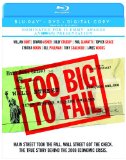| Reviews & Columns |
|
Reviews DVD TV on DVD Blu-ray 4K UHD International DVDs In Theaters Reviews by Studio Video Games Features Collector Series DVDs Easter Egg Database Interviews DVD Talk Radio Feature Articles Columns Anime Talk DVD Savant Horror DVDs The M.O.D. Squad Art House HD Talk Silent DVD
|
DVD Talk Forum |
|
|
| Resources |
|
DVD Price Search Customer Service #'s RCE Info Links |
|
Columns
|
|
|
Too Big to Fail
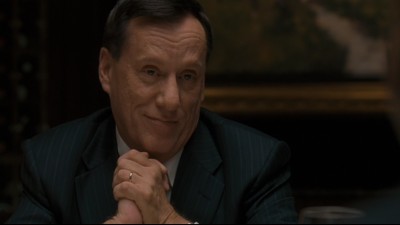
Please Note: All of the images used here are from the accompanying standard-definition DVD and are not taken from the Blu-ray under review.
Director Curtis Hanson's Emmy-nominated 2011 HBO film, Too Big to Fail, sounded so potentially promising. Sure, Hanson has had a checkered career, but it's had more than its share of peaks, encompassing such worthy accomplishments as L.A. Confidential and Wonder Boys. And sure, the huge ensemble cast features some semi-washed-up wild cards (James Woods, Bill Pullman, Matthew Modine) and TV refugees both more (Cynthia Nixon) and less (Topher Grace) illustrious alongside its powerhouse actor's-actors like William Hurt and Paul Giamatti. And of course the most dramatic, relevant story can be planed down into blah conventionality in the telling and have its interest sapped by poor execution, even the juicy one told by this film: the collapse of Lehman Brothers investment banking firm in 2008, a central event in America's largest investment banks' general threat to fall like dominoes and trigger a depression, which led to privately held concerns receiving a virtually condition-free $700 billion government handout courtesy the taxpayers, in an episode from which American politics will long be reeling. But it was reasonable to hope that Hanson and some talented actors would make for a team that could come up with something better than Too Big to Fail, which presumably means to ride the zeitgeist of recent memorable events and come up with smart insights and powerful drama via a cleverly-done dramatization. Unfortunately, it's not cleverly done at all, serving instead as a cautionary tale about how deceptively, alluringly easy it must seem to transform such an intriguing, high-stakes "true story" into hard-hitting political drama, when in fact it's a filmmaking journey just as uphill, tangled, and demanding as any other to shape and shoot such a story in a way that genuinely achieves the desired cinematic potency and incisiveness.
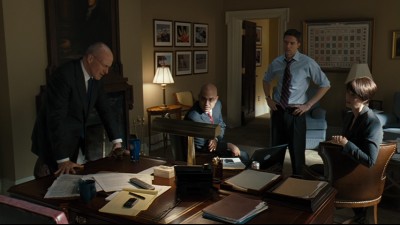
As with many such disappointments, the weakness can be traced directly to the screenplay, adapted by Peter Gould (Breaking Bad) from New York Times financial reporter Andrew Sorkin's book. The book was, obviously, not a novel; it was nonfiction, whose rough cinematic equivalent would be a documentary. But, perhaps because the economic crisis had already been very well addressed in that format by Charles Ferguson's Inside Job, Gould steers clear of even a docudrama, instead taking on the impossible task of jamming Sorkin's tome on the extensive, complicated web of characters and events involved in the '08 financial-sector meltdown into a straight 90-minute dramatization. The results make it clear that either a much tighter focus on maybe an extract of the Sorkin book for a shorter film, or a longer, miniseries-length span in which to do justice to the sprawling detail of the story, may have worked better. As it stands, though, Too Big to Fail just feels like a padded-out summary rather than a story actually being told.
Under those unpromising circumstances, we get James Woods as Richard Fuld, CEO of Lehman Brothers, whose arrogant pride is definitely coming before a fall as his firm (tanking as the consequences of deregulation and years of resultant greedy, shady real-estate dealings come home to roost) looks set to become the poster child and whipping boy for the reckless misdeeds widespread throughout the industry. It's the job of Secretary of the Treasury Hank Paulson (William Hurt) and his perpetually confused, press-bullied underlings (Topher Grace, Cynthia Nixon, Ayad Akhtar, and Joel Slotnick) to goad the unrealistic, unrepentant Paulson and his bank-executive peers into finding an illusory "private solution" to an economic catastrophe itself brought on by such laissez-faire conservative economics. The mixed motives and general uncooperativeness of the bankers lead to Paulson compromising his free-market principles and trying to stave off a severe recession/depression by proposing a government bailout without any anathema "intervention" (i.e., any safeguarding conditions or regulations attached to the government "loan" being accepted by the banks to ensure that they used the massive funds to benefit the public). We also get Billy Crudup (Thin Ice) as Paulson's successor under President Obama, Tim Geithner; and Paul Giamatti as Federal Reserve Chairman Ben Bernanke, Paulson's and subsequently Geithner's boss.
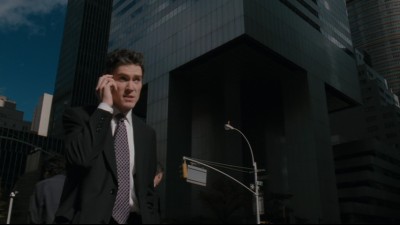
But it's pointless to discuss these figures as characters; Gould has turned them all into rhetorical question-asking, expository dialogue-spouting automatons whose sole purpose, even in their ostensibly personal moments (as in the interactions between Paulson and his wife, played by Kathy Baker), is to verbally sum up the basic facts of Bernanke's book; the majority of the time, they may as well be reciting passages into the camera. Saddled with a script offering so very little of dramatic interest, Hanson makes overcompensating stylistic attempts to ameliorate it -- labeling each character with onscreen titles that come up as he or she is introduced, poor imitations of Mean Streets and Reservoir Dogs in his freeze-framing, formation-striding execution of the big bankers' arrival to the mandatory emergency meeting called by Paulson -- only make things worse, unless you're very easily distracted (which these gimmicky, slick maneuvers, along with Marcelo Zarvos's pulsing, throbbing, pestering, and omnipresent percussive score seem, insultingly, to take as a given).
Too Big to Fail is a humbling but perhaps necessary reminder of a couple of facts too often overlooked by auteur-minded movie lovers (like this reviewer, for one) who tend to default to the Director-as-Author concept when considering a picture. For one, a director like Curtis Hanson is not a writer/director like Michael Haneke or Bela Tarr (or even Paul Thomas Anderson), writing/adapting his own scripts; nor is he an auteur like Howard Hawks or Robert Altman, ever capable of annexing other writers' material onto their singular, identifiable cinematic worlds. Rather, he's a talented craftsman whose success depends to the largest extent on the quality of what his screenwriter has given him, which in this case is on the very tepid, not very well-considered side. For another, a screenwriter's role can vary, but the script is integral; like it or not, obvious, hamfisted writing has the power to obliterate anything visual or temporal the director might try, no matter how ingenious (or, in the case of this film, slick) his strategies for overcoming it. One wonders why Hanson didn't either rewrite some lines or let the actors try to massage and humanize some of Gould's glaringly clumsy dialogue, which often makes the characters sound for all the world like they're reading aloud from a newspaper. The harried flatness resulting from all those missteps doesn't really provoke any ill will toward those responsible (even Gould, who would seem to represent the buck's final stop here, has won much acclaim in his role as regular Breaking Bad scribe), but rather regret at a wasted opportunity for a number of fairly well-proven talents. Here's hoping that whatever instincts led Hanson to take on L.A. Confidential and Wonder Boys kick in next time and override the more dubious ones that got him into the losing gamble of Too Big to Fail.
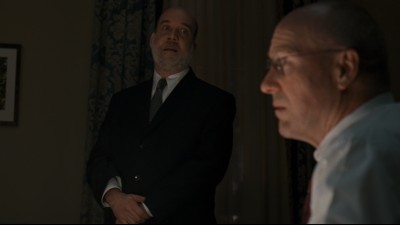
THE BLU-RAY DISC:
The film looks much better on this AVC/MPEG-4, 1080/24p transfer (presenting the film at its original-airing aspect ratio of 1.78:1) than it deserves to: It's not cinematographer Kramer Morgenthau's fault that the mise-en-scène and editing here make such uninspired use of his evident skills, and the excellent picture quality of the disc does full justice to his often impressively nuanced, well-lit shots, leaving (ironically, for a film made for smaller screens) all of its fine celluloid grain intact, colors and skin tones looking vivid but natural, and no compression artifacts or any other transfer flaws to be seen.
Sound:The disc's DTS-HD Master Audio soundtrack is full, rich, and vivid, despite one wishing, in the face of Marcelo Zarvos's relentlessly and bothersomely thumpy, techno/Terminator-like score, that its sonorous fidelity were a bit less perfect. "Perfect" is, indeed, how to describe the audio quality here; there isn't a single moment that doesn't sound perfectly balanced, full, and crystal clear.
Extras:--"The Making of Too Big to Fail" is literally nothing more than a 90-second commercial with soundbites and quick-edited (even more so than the overstimulated film itself) footage that, if it wasn't actually run on HBO as a promotional spot, feels made for just such a superficial purpose.
--"Opening the Vault on the Financial Crisis." Paradoxically, the most substantial supplement here is much more informative and interesting in 20 minutes than the 90-minute film itself, which for the most part wastes its time futilely trying to dramatize the story. Cast members, author Andrew Ross Sorkin, screenwriter Peter Gould, and various journalists do much the same thing as the characters in the film, reciting the facts of the financial meltdown as they understand it, only here, in a more documentary format, it's much more succinct and fitting.
--"Timeline of a Crisis," a handy, interactive onscreen thumbnail rundown of all the salient dates and events, from late '07 to late '08, in the U.S. market/economy's plummet.
--Both the standard-definition DVD version of the film and a downloadable digital copy.
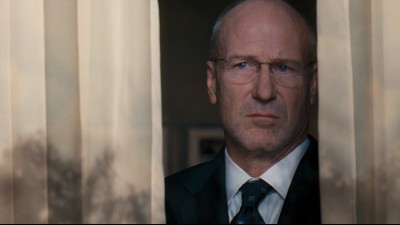
Don't be fooled by all the appealing talent involved, or the fact that the auspices of HBO usually signify top-notch (or at least better-than-average) programming; Curtis Hanson's Too Big to Fail doesn't even come close to achieving its fool's errand of compacting the labyrinthine story of the 2008 economic meltdown into a 90-minute running time. And the hasty, ill-advised choices Hanson and screenwriter Peter Gould have made in trying to fill this impossibly tall order -- dialogue that does nothing but identify and connect the dots of the story, an excess of cynical stabs at disguising the anemic script and relentless, sledgehammer-obvious expository dialogue with hectic, "cool" editing tricks and an aggressively annoying score -- do a disservice to the director and writer themselves, on whom the shoddy workmanship reflects most badly; to a multitude of actors whose talents (of admittedly varying degrees, ranging from Paul Giamatti and William Hurt to Matthew Modine and Topher Grace) that should not be wasted like this; and, worst, to us, the audience. I would like to be able to at least advise a rental of the thing for any curious or completist fans of Hanson or his actors here, but there is such a dearth of inspiration or interest in Too Big to Fail that the only fair recommendation is to Skip It.
|
| Popular Reviews |
| Sponsored Links |
|
|
| Sponsored Links |
|
|
| Release List | Reviews | Shop | Newsletter | Forum | DVD Giveaways | Blu-Ray | Advertise |
|
Copyright 2024 DVDTalk.com All Rights Reserved. Legal Info, Privacy Policy, Terms of Use,
Manage Preferences,
Your Privacy Choices | |||||||









